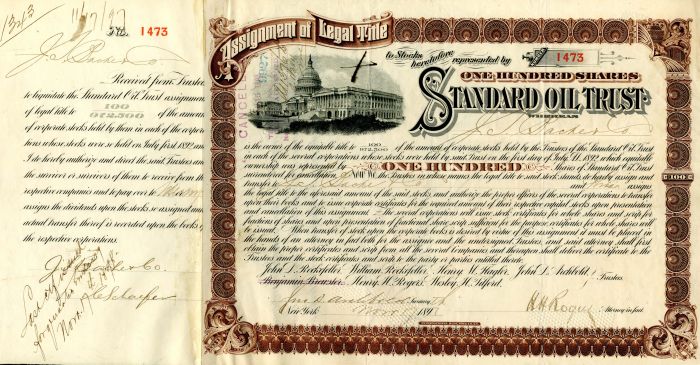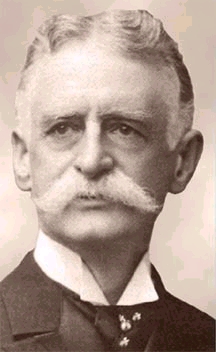Standard Oil Trust issued to J.S. Bache and Co. and signed by John D. Archbold and H.H. Rogers - Stock Certificate
Inv# AG1631 Stock
Stock signed by Archbold as secretary and Rogers as attorney. Portraits and biographies included.

John Dustin Archbold (July 26, 1848 in Leesburg, Ohio – December 6, 1916 in Tarrytown, New York) was an American capitalist and one of the United States' earliest oil refiners. His small oil company was bought out by John D Rockefeller's Standard Oil Company. Archbold rose rapidly at Standard Oil, handling many of the complex secret negotiations over the years. By 1882 he was Rockefeller's closest associate, and typically acted as the company's primary spokesman. Rockefeller after 1896 left business matters to Archbold while he pursued his philanthropy; as vice president Archbold effectively ran Standard Oil until his death in 1916. Inspired by Rockefeller's policies, Archbold's main goals were stabilization, efficiency, and minimizing waste in refining and distributing petroleum products. The company was broken up by the Supreme Court in 1911 into three dozen smaller operations, Archbold became president of the largest one, Standard Oil of New Jersey. Archbold was born to Methodist minister Reverend Israel Archbold and Frances Foster Dana (Archbold) in Leesburg, Ohio. After being educated in public schools, he moved to Pennsylvania by 1864. On February 20, 1870 Archbold married Annie Eliza Mills, "daughter of Samuel Myers Mills of Titusville and Lavinia Jenkins.”
The couple had four children: • Mary Lavina Archbold (b 1871) • Anne Mills Archbold (b 1873), mother of John Dana Archbold • Frances Dana Archbold (b 1875) • John Foster Archbold (b 1877-1930), father of zoologist Richard Archbold In 1885, Archbold purchased a large mansion in Tarrytown, New York. The estate, called Cedar Cliff, was located at 279 S. Broadway just across from the Carmelite Transfiguration Church. In 1864 Archbold went to the north-west Pennsylvania oil fields and spent 11 years in the oil industry there. When John D. Rockefeller's Standard Oil Company began buying up refiners in this oil-rich region, many independent refiners felt squeezed out, and Archbold was among Standard's harshest and loudest critics. In 1885 after becoming skeptical of reports of oil discoveries in Oklahoma, he sold-out at a loss, saying “I’ll drink every gallon produced west of the Mississippi!” Archbold was subsequently recruited by Rockefeller to Standard Oil, where he became a director and served as its vice-president and president until its dissolution in 1911. In 1911-1916 Archbold was president of the Standard Oil Company of New Jersey. In 1886 Archbold became a member of the board of trustees of Syracuse University, and was the board’s president from 1893 until his death in 1916. From 1893 to 1914, he contributed nearly $6,000,000 for eight buildings, including the full cost of Archbold Stadium (opened 1907, demolished 1978; the Carrier Dome was built on this site), Sims Hall (men's dormitory, 1907), Archbold Gymnasium (1908, nearly destroyed by fire in 1947, but still in use), and the oval athletic field.
Archbold was involved in a scandalous affair involving monetary gifts to the Republican Party. In 1912 he was called to testify before a committee which was investigating political contributions made by the Standard Oil Company to the campaign funds of political parties. He claimed that President Theodore Roosevelt was aware of the $125,000 contribution made by Standard Oil Company to the 1904 campaign fund of the Republican Party, but President Roosevelt produced letters written by him which directed his campaign managers to return such monetary contributions if they were offered. Archbold died of complications from appendicitis in Tarrytown, New York on December 6, 1916. He is buried in Sleepy Hollow Cemetery in Sleepy Hollow, New York. -In 1914, the "John Dustin Archbold College of Liberal Arts" at Syracuse University was renamed in his honor. The entrance to the university's Hall of Languages remains inscribed with this name. -The John D. Archbold Memorial Hospital, now the Archbold Medical Center, in Thomasville, Georgia, was established in 1925, through a donation by his son, John Foster Archbold. -His grandson, John Dana Archbold, was a member of the Board of Trustees of Syracuse University from 1976 to 1993. -The John Dana Archbold Theatre at Syracuse Stage (Central New York's only professional theater) is named after his grandson.

Henry Huttleston Rogers (1840-1909) was born into a working-class family in Mattapoisett, Mass. He was the son of Rowland Rogers and Mary Eldredge Huttleston Rogers. Both parents had roots back to the pilgrims, who arrived in the 17th century aboard the Mayflower. His mother's family earlier had used the spelling "Huddleston" rather than "Huttleston," and Henry Rogers' name is often misspelled using this earlier version.
In 1861, 21-year-old Henry pooled his savings of approximately $600 with a friend, Charles P. Ellis. They set out to western Pennsylvania and its newly discovered oil fields. Borrowing another $600, the young partners began a small refinery at McClintocksville near Oil City. They named their new enterprise Wamsutta Oil Refinery.
In 1870, John D. Rockefeller formed Standard Oil Company of Ohio and started his strategy of buying up the competition and consolidating all oil refining under one company. It was during this period that the Pratt and Henry Rogers interests were brought into the fold. By 1878 Standard Oil held about 90% of the refining capacity in the United States.
In the early 1871-72, H. H. Rogers was working for Pratt and Company and other refiners became involved in a conflict with John D. Rockefeller, Samuel Andrews, and Henry M. Flagler and the infamous South Improvement Company. South Improvement was basically a scheme to obtain secret favorable net rates from Tom Scott of the Pennsylvania Railroad and other railroads through secret rebates. The unfairness of the scheme outraged many independent oil producers and owners of refineries far and new alike.
His final business achievement, working with partner William Nelson Page, was the building of the Virginian Railway from the coal fields of southern West Virginia to port near Norfolk at Sewell's Point, Virginia, in the harbor of Hampton Roads. For many years, it was labeled both an engineering marvel and the "richest little railroad in the world," forming part of today's rail network for Norfolk Southern.
While considered ruthless in business matters, Henry Rogers also had a much kinder and generous side. His hometown of Fairhaven, Massachusetts continues to enjoy his many infrastructure gifts. Rogers' late life friendships included such diverse persons as Mark Twain, Ida Tarbell, Helen Keller, and Booker T. Washington.
Rogers was a low-profile philanthropist with a widely hated public image as a robber baron. It was only after his death in 1909 that Dr. Washington felt he could publicly reveal that, over a period of more than 15 years, Henry Rogers had been funding over 65 small country schools and several larger institutions in the South for the betterment and education of African Americans. Dr. Washington not only credited Rogers with substantial aid and encouragement, but with instituting the then-innovative procedure of matching funds. Rogers felt that as well as extending the financial reach, their participation contributed to the beneficiaries' self-esteem and steps to self-sufficiency.
He was listed in a 1996 study as one of the 25 all-time most wealthy individuals in United States history.
A stock certificate is issued by businesses, usually companies. A stock is part of the permanent finance of a business. Normally, they are never repaid, and the investor can recover his/her money only by selling to another investor. Most stocks, or also called shares, earn dividends, at the business's discretion, depending on how well it has traded. A stockholder or shareholder is a part-owner of the business that issued the stock certificates.









Ebay ID: labarre_galleries